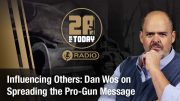
A surprising study released late February concluded that when physicians and other healthcare professionals contribute their own funds to political action committees, those committees, in turn, reflect pro-Second Amendment viewpoints.
The study, completed by Jeremiah Schuur, M.D., and published at the JAMA Network Open — “open access medical research and commentary” — supported by the American Medical Association, compared political contributions during the 2016 election cycle (from January 1, 2014 through December 31, 2016) to various House and Senate candidates running for office.
Schuur was surprised at the outcome: “Physician organization–affiliated political action committees contributed more money and to a higher proportion of candidates who voted against expanding firearm background checks … suggest[ing] that contribution patterns of most physician organization–affiliated political action committees are inconsistent with their policy recommendations.”
From the study:
This study examined the 25 largest physician organization–affiliated PACs during the 2016 election cycle. Twenty of 25 PACs (80%) contributed more in total to incumbent Senate candidates who voted against SA 4750 [universal background checks] than to those who voted for it, and 24 of 25 PACs (96%) contributed more in total to incumbent US House of Representatives candidates who did not cosponsor HR 1217 [universal background checks] than to those who cosponsored it.
A total of 21 of 25 PACs (84%) contributed more total dollars to US House of Representatives and Senate candidates rated A by the NRA-PVF [the NRA’s Political Victory Fund] than to those not rated A.
Twenty-four of 25 PACs (96%) contributed to a greater proportion of candidates rated A by the NRA-PVF than candidates not rated A.
This was upsetting to Dr. Schuur:
Physician organization–affiliated PACs included in this study donated more funds to more US House of Representatives and Senate candidates who oppose firearm safety policies [i.e., universal background checks] than to candidates in support of such policies….
The overall pattern was not consistent with professional societies’ advocacy for firearm safety [i.e., universal background checks] and … may pose a barrier for effective advocacy on this issue.
Typical of the anti-gun, anti-Second Amendment ideology espoused by many, if not most, physician-related organizations is the Annals of Internal Medicine. Annals has been decidedly anti-gun, promoting the entire wish-list of infringements favored by anti-gunners for more than 20 years. It has been busy pushing “approaches that the evidence suggests will be effective in reducing deaths and injuries from firearm-related violence.”
Their “wish-list” includes advice for family doctors:
Physicians should counsel patients on the risk of having firearms in the home; and
[They] are encouraged to discuss with their patients the risks that may be associated with having a firearm in the home, and recommend ways to mitigate such risks.
Annals’ wish list goes far beyond such advice, however:
Sales of firearms should be subject to satisfactory completion of a criminal background check and proof of satisfactory completion of an appropriate education program on firearms safety;
Although there is limited evidence in the effectiveness of waiting periods in reducing homicides, waiting periods may reduce the incidence of death by suicide;
Lawmakers should carefully consider the growing but limited body of evidence that suggests that concealed-carry law may create a greater risk of firearms injuries and deaths than any protective value they may provide;
[The American College of Physicians] opposes concealed-carry reciprocity legislation…;
States that decide to permit concealed carry in their jurisdictions should at a minimum require, as a condition of obtaining a permit, training in appropriate handling and storage of firearms in their homes, automobiles, workplaces, and on their person to reduce the risk of unintentional deaths or injuries;
The College supports a ban on firearms that cannot be detected by metal detectors or standard security screening devices, including but not limited to 3D-printed firearms;
Although evidence on the effectiveness of the Federal Assault Weapons Ban of 1994 is limited, the College believes that there is enough evidence to warrant appropriate legislation and regulation to limit future sales and possession of [semi-automatic] firearms; and
ACP supports the enactment of extreme risk protection order (ERPO) laws which allow family members and law enforcement officers to petition a court to temporarily remove firearms from individuals who are determined to be at imminent risk of harming themselves or others while providing due process protections.
Who knew that family physicians and other health professionals had the responsibility for not only teaching gun safety to their patients during an in-office visit but for pushing for anti-gun legislation through its various societies, groups, and organizations? House Representative Roger Marshall (R–Kan.), a former obstetrician-gynecologist, said such groups were going way beyond their areas of expertise in promoting these anti-gun policies:
My suggestion is they stick in their lane. They have plenty of work to do to help patients and to help physicians and I think it’s outside their bandwidth. As an obstetrician, I shouldn’t be doing heart surgery.
Photo: Igor Kanke / iStock / Getty Images Plus
An Ivy League graduate and former investment advisor, Bob is a regular contributor to The New American primarily on economics and politics. He can be reached at [email protected].



